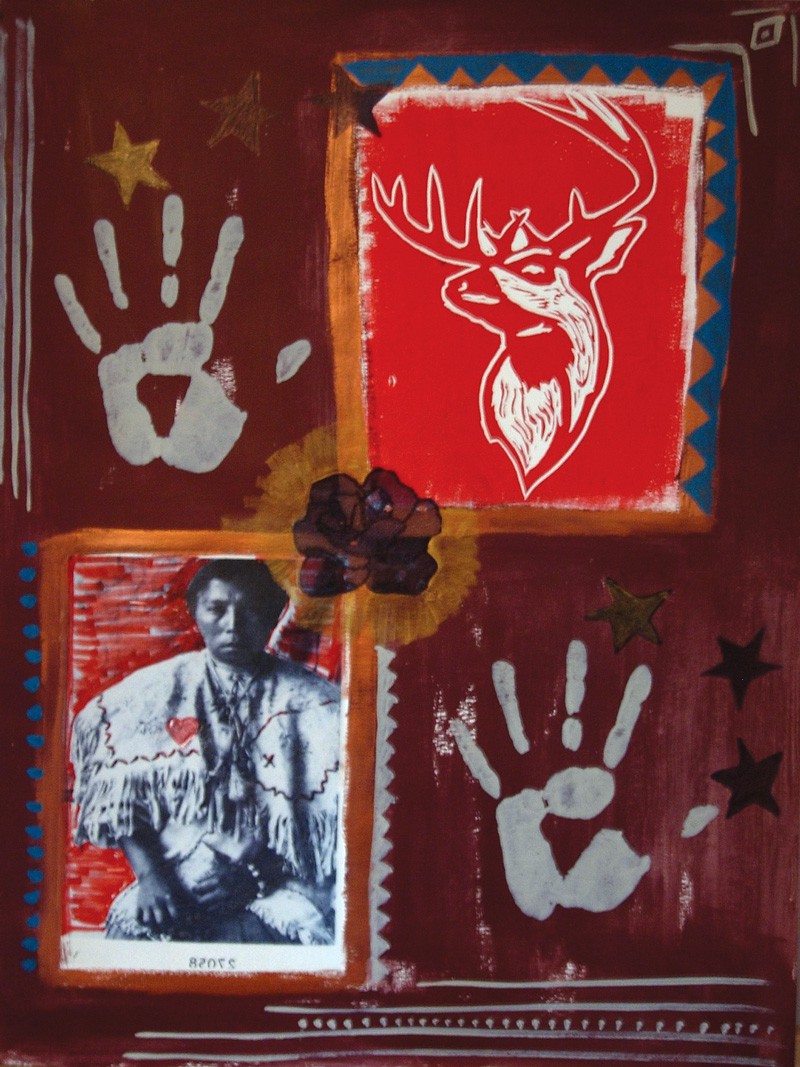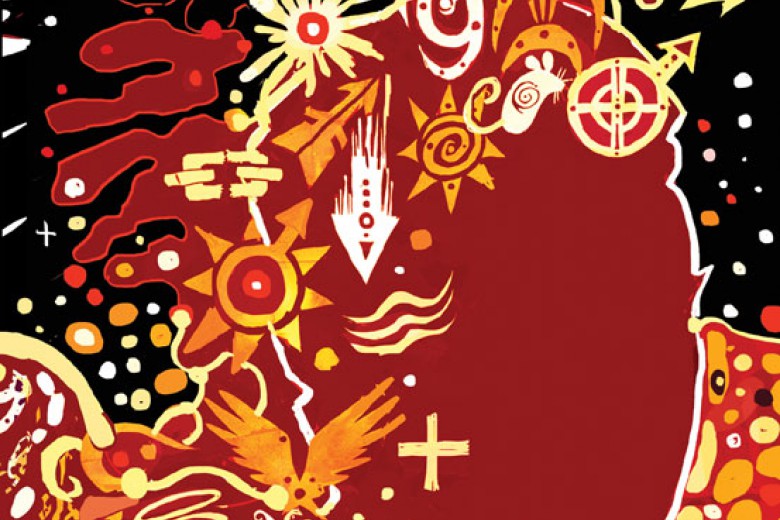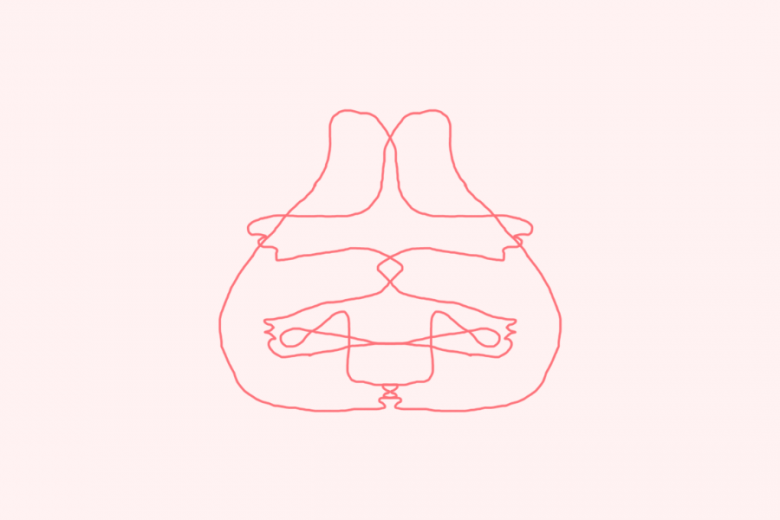
There’s a gaping hole in reddish-brown earth and clay. A hole formed in the shape of a deep, round bowl, a bowl exposed to the elements and bound down by aki, the earth. Her flank is textured and her texture is moist. Nibi, water, is somewhere in the recesses of their memories, forcing breathing holes through red density. Somewhere in the recesses of his history there is memory, water, and breathing holes.
Mokijiwanibiish – spring water – salt and tears are the dampness of her texture. Mokijiwanibiish flowing through aquifer, down a hill, pushed up, over limestone, and through moss. Moss for soaking up life, holding blood.
In the bottom of this bowl, this gaping hole, is loose dirt and tiny balls of clay, stones, and granules from a long, ancient grinding of bimaadiziwin, life and living life. Sediment lends itself to a kind of sentiment when caught by sunlight for a few minutes around noon. On interesting days, something of mass runs by or dances or ruts or stirs aki from the inside out. On these days, all the little pieces rub together faster than they were before and make sound. This gaping piece of earth is part sheshegwan – a shaker, a rattle.
It’s not clear why how to be lonely is this way, but it’s certain it wants a tool to dig. Or, scrape away the sides, the bottom, the form. Clear it away so it’s more, or less, or something. Make more space for nodin, wind. Or, more surface space for nibi. Just make more. Just dig deeper. Scrape. Be with aki.
***
Get dolled up, man. Go to the mall. Shop. Eat. Walk around. See and be seen.
Buy.
Stay in your pajamas, hon’. Go online. Browse.
Shop.
Pull on the favourite jeans. Go to the pawnshop with your friends.
Get yourself a deal.
Call in your order or have someone call in your order.
Go pick it up. Or, try it on first and then get it.
Hudson’s Bay Company. Sally Ann. The Dollar Store. ViVi’s. Target. Winners. Sears. Holt Renfrew. The Mink Mile.
Get more.
Feel her hand reach into your belly, move his fingers around, gently squeeze. Inhale. Feel them let go. Exhale. Close your eyes.
Wait for the growl to return. Pacify.
***
There is a tugging. A tendril of something wound around that bowl, around the inside of their exposure. Wound within the roundness of his walls. Saturated and stained and reddish-brown, gritty clay, this tendril appears to have a song. Vibrations emanate from the ruggedness of her form. They want to sing a song of deepness, of ground and unwavering. Of I’m okay. Of I am of the strength of all the women violated and still giving birth, boys being pushed away when they seek comfort, queer recovery, babies’ spirits unrecognized, girls being pushed away when they seek action, men’s heartbreak. I am aki, folding into myself and bursting forth from myself, bgeji. He wants to sing this song for all the women and boys and queers and babies and girls and men that will be lonely in this world, who will have moments, hours, days, years of lonely. She wants to sing this song so we’ll know how to be lonely. Moment lonely, hour lonely, day lonely, year lonely, decade lonely, almost miiyaaw zhaa lonely, almost five hundred years lonely. Four hundred years of surrounded-by-millions-of-strangers lonely. Four-hundred-years-of-occupying-others lonely. They want us to wind this tendril around the inside of our exposure. Feel her vibrations. Sing it into being for those we are dreaming into existence.
***
Yeah. Take something sharp, anything sharp or jagged, ragged. A paper clip. Make sure no one is around. Fold up your sleeve, roll down your sock. Take it and scrape it. Cut.
Lonely, disguised as pain, wants a distraction. Song or no song, a beat is needed, will be found.
Make something else
hurt more
is a good beat
to dance ‘round.
Makes the pain less
than it was before
is an acceptable
sound.
Squeeze, release.
Waawaashkeshi could feel her yearning. It had been a long, long time since they had been yearned for by Ikwe, woman. It had been a long time since Ikwe felt this yearning. Each knew they were on the cusp of turning themselves over to each other. Waawaashkeshi, deer, the ultimate giver. Sharing life, giving it up so the People may live. Ikwe, life-giver, and soon, with her first hunt, life-taker. Taking life so the People may live. After looking into her great-grandmother’s eyes, after hearing his story of his grandmother’s practical ways of being with the land, Ikwe knew she had to go over there to the islands with Akiwenzii, the old man, and learn about life-giving and life-taking.
With the shot of the gun she covered her ears. Forced herself to believe that Waawaashkeshi gave itself to them as a gift. If this was the case, though, why did it turn around and go the other way when it saw her and the old man? Could it be that even in the moment of its life-giving intention and purpose it had doubt, fear, second thoughts? Is this turning away from giving life a way to make the People chase after life, work for it, and engage in it? Is this how the People, in the chasing of life to take life, learn humility? Bind ourselves to the ground and Waawaashkeshi so we can never be chi-nendiz, putting ourselves above others? Is this taking of life the way to know how to weep at her feet humbled, so humbled as to never raise a hand or drill to her? So complicit in death-making that we forge ahead always in life-making?
***
All those youth. Seven to fourteen years old.
Just walked over there like that. To the tree line. Not too far beyond the tree line because they were all pretty afraid of her at night. Together, they were brave and courageous.
Been telling people for a long time that they were up to it. Heard about their peers doing it.
Left a note at the administration offices. Parliament Hill. Coffee table. Dashboard. Taped on a TV screen, a laptop. Some left none.
They never heard the stampede of their community running. The thud thud thud of running for their lives, their lives dead there just beyond the tree line.
Those youth never felt aki shake from within with the desperate plea of their people running toward them.
A mourning song is a wail, a lament, a slow, low, quiet whisper because sound is tempered by pain.
A mourning song is not a song for how to be lonely.
Ode, heart, forever seized.
***
Waawaashkeshi could feel the thud of hooves running, Ikwe hooves. They could hear the crunching of oak leaves and dried sticks, feel movement on the surface and below aki. Could feel a shaking, a rattling, vibrations moving out. They could see the breath of their lives rising and then mingling with Ikwe’s. Could feel her warmth as she fell on knees beside them and threw her own body over them and made sound. Waawaashkeshi never knew what it was to feel the energy, the physicality, and the warmth of Ikwe over her. Never knew the vibrations of gratitude and love and grief and shock. Their own racing hearts pumped as fast as Ikwe’s. Waawaashkeshi never knew such a mourning song from People. Never knew the sound and feel of whispers, hands over their muzzles, eyelids. The sound and rhythm of talking aki back to them as their spirits danced out:
manidooyag, chi miigwech gaa miizhyaang. aapidjii nendam mashkikimakwe miinawaa gizhewe manidoo. gichi gichi miigwech waawaashkeshi! miigwech, miigwech, miigwech gaa miizhyaang – miijim miinawaa mashkiki miinawaa your hide. thank you for giving us your life. waawaashkeshi, niin ekinomaaget, chi miigwech for teaching about life with your death, for giving us your life. ooooooooOOO!
***
It looks like fun. Wooooooooooooo-hooo! Yea-ea! All right! Kind-of-fun.
That raucous laughter and out-there party cry? It’s genuine. A genuine sound made after a lot of caring has been given to the one you love and gone unanswered. Gone unanswered for a long time.
Lack of reciprocity will gut any relationship.
That there laughter is the sound of letting-go-but-
not-wanting-to-let-go.
It also looks like fucking. A lot.
Or, it looks like shutting all that sexual energy down for too long, way too long.
Or, drugging.
Feels like a three-day migraine followed by a two-day coke binge that takes you through three cities and a few towns. The latest drug binge will do that too. It’s a blackout in the ritzy cottage where you don’t even get the satisfaction of remembering how you finally spit your truth to the friend who hates you.
Or, both.
It’s a short skirt, dress pants, jogging pants on leather seats cruising the depths of the cool, stale-smelling, underground parking and riding the mirrored elevator to the top floor where you are beautiful – a beautiful thing making other beautiful things with more money and power less lonely.
Or, ugly.
It is a stagger at night along dirty curbs and blurry lights with another or two. Pulsating in an alley or stairwell. A suburb, backyard barbecue with jacuzzi. Ski or beach resort. It is the ebb and flow of a (monogamous) marriage put out for society, institution, status, or avoiding a loss. This is different than the ebb and flow of a (monogamous) marriage put out for happiness and contentment, growing more life, or because it continues to fire you up. Or, at least is a moss bag holding the embers, the home fire.
Clenching and letting go can teach a whole lot. But fun?
In the background, a low, low rhythm. It was the kind and gentle intonations of Akiwenzii speaking the same language as Ikwe’s disrupted-recovery language, only his was an undisturbed, unfettered flow from his ancestors, directly from the land where he walked for thousands of years. Every word, pause, fluttering of sound and breath sent Waawaashkeshi’s spirit out, leaving their physical body to do what they were intended. Ikwe laid asemaa, tobacco, down in thanks and covered Waawaashkeshi’s face with giizhigaatig, cedar. Akiwenzii made some cuts, gave Ikwe that piece of Waawaashkeshi that is to be given back to creation and aki and said,
“This young buck gave himself to you. Here. Hang this from a tree and offer it back.”
He then reoriented himself, sat back, handed Ikwe mookaman, the knife, and jutted his chin out towards Waawaashkeshi,
“Now, for the cleaning. I’ll tell you what to do.”
[Insert list of rules for what to do to live a good life according to nation-state standards. Or, don’t. If you do, be sure to identify social location, religious and political affiliation, and your views on the environment and economic development because it matters. If you are Indigenous, or in alliance with the environment or Indigenous peoples (which in many cases also means being against major economic development plans), skip and read on, otherwise risk being flagged as an individual or community of concern. Perhaps even (potential) terroristic material. In this scenario, how to be lonely looks a lot like toeing the line. A template for a five-year plan, based on who you are in relationship to the nation-state, is a good tool to get you started.]
***
Every woman needs a tool. Actually, every person needs a tool. This much she knew without ever having been told. We need tools for cutting or scraping. Scraping hard maple sugar away from the cast iron pan, or cleaning a hide. For cutting string so you can build things, like a house. Or digging. A tool is needed to dig a hole where Waawaashkeshi’s insides will be buried. So, Ikwe gets one from her bundle. She removes some surface rocks, flinches at a nail that tears. She can still smell the warm blood rising in the air, soaking into moss. She digs and digs, deeper. Scraping away sides, widening and deepening this hole. She hears paapaase and gjigjigaaneshiinh – the woodpecker and chickadee – a motorboat far away, likely a cottager or their kids. Or, maybe it’s the MNR. She hears Akiwenzii’s heavy breathing as he rests a little.
She scrapes away the sides of this hole in this island amongst islands and pays close attention to the texture. Pieces of flank peel up; water seeps. Of course water seeps. She hits a layer of dark, porous, wet soil and this fills her nostrils. She rubs it into the etches of her palm, fingertips. So full, so full. This life is so full. There is so much for all of us. She sees a string, dark blue and dirt, and she pulls it out of aki. A tendril of blue buried here so deep. Her imagination wanders along the contours of this string as it serpentines in nodin, the wind. She returns it and cannot resist placing her hand on the bottom, spread out, to feel the cool and the damp. She lowers her face to smell her, feel the cool of aki and nibi, mashkikimakwe (mother earth). Her song comes, and she hums and begins to sing. Lifting herself back up, she runs her hand fully around its form, pressing slightly more firmly with her fingertips, rubs them together. Smells them, then tastes. Healthy. Healthy? Akiwenzii startles her with his laugh and says, “Aambe, let’s go.”
She quickly and lovingly buries his insides, lays asemaa and a little giizhigaatig. Continues singing as she scoops the dirt back into the hole, on top of his remains.
They hoist Waawaashkeshi into the boat and make their way back to the mainland. Akiwenzii asks about that song. She tells him it came to her years ago, at the mouth of a great lake, on a public beach. It came one spring about 10 years ago. She was just learning about being colonized, in her recovery from this and learning to live in it; she was also coming out of a long-term relationship. There were no people around that day, just her, the rough water, and surly sky. There was a stand of poplars to provide a little bit of shelter from the cutting wind. That song just came to her as she sat there. At first she was nervous, embarrassed, and afraid to let that sound out, but she pushed herself on this, felt strongly about honouring it. She sang it over and over, and now it comes whenever, in good times and bad. It always makes her feel connected, whole, like everything will be okay. He nodded. Said he heard her kids humming it here and there and wondered about it.




